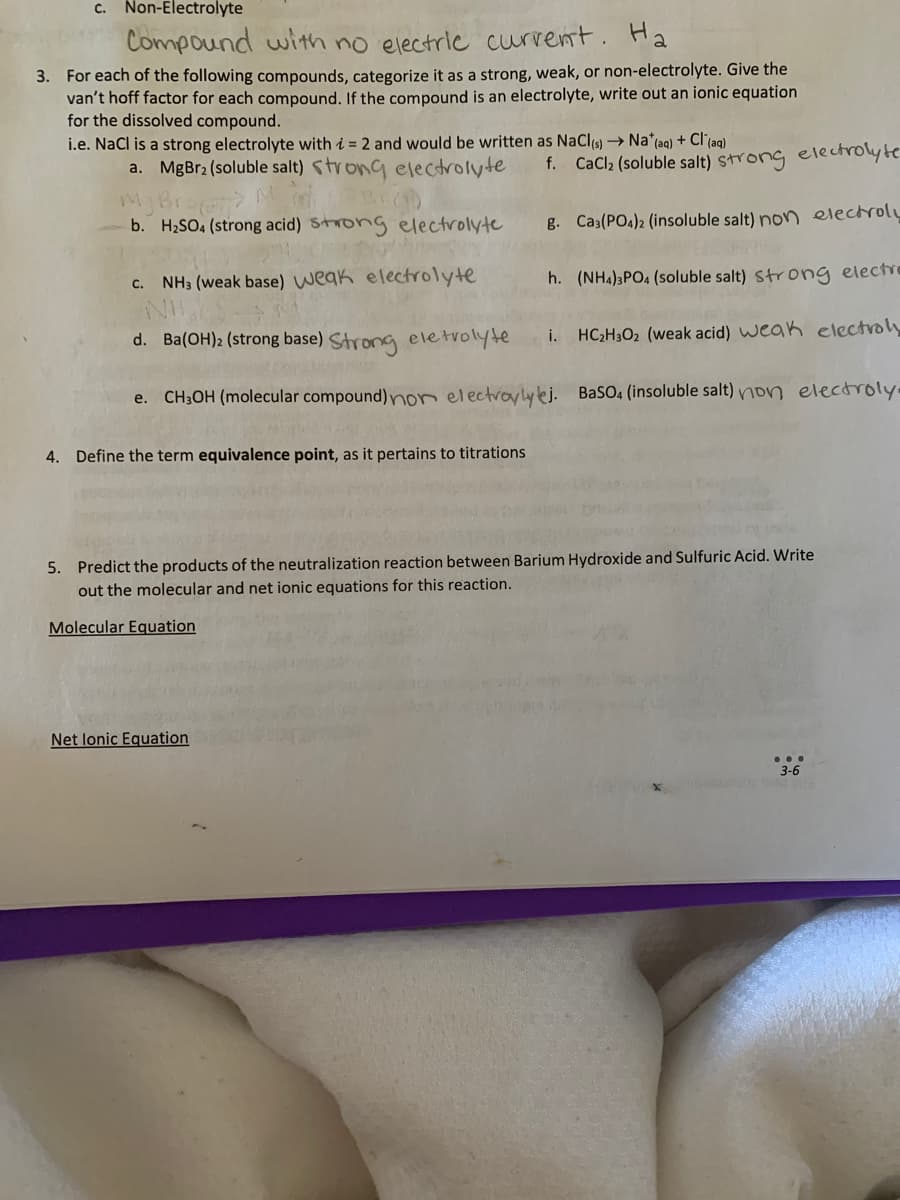3. For each of the following compounds, categorize it as a strong, weak, or non-electrolyte. Give the van't hoff factor for each compound. If the compound is an electrolyte, write out an ionic equation for the dissolved compound. i.e. NaCl is a strong electrolyte with i = 2 and would be written as NaCl(s) → Na*(aq) + Cl(aq) a. MgBr2 (soluble salt) strong electrolyte M My Bra b. H₂SO4 (strong acid) strong electrolyte f. CaCl₂ (soluble salt) strong electroly g. Ca3(PO4)2 (insoluble salt) non electrol c. NH3 (weak base) weak electrolyte NH h. (NH4)3PO4 (soluble salt) strong elect d. Ba(OH)2 (strong base) Strong eletrolyte i. HC₂H30₂ (weak acid) weak electro e. CH3OH (molecular compound) non electroylykej. BaSO4 (insoluble salt) non electrolu
3. For each of the following compounds, categorize it as a strong, weak, or non-electrolyte. Give the van't hoff factor for each compound. If the compound is an electrolyte, write out an ionic equation for the dissolved compound. i.e. NaCl is a strong electrolyte with i = 2 and would be written as NaCl(s) → Na*(aq) + Cl(aq) a. MgBr2 (soluble salt) strong electrolyte M My Bra b. H₂SO4 (strong acid) strong electrolyte f. CaCl₂ (soluble salt) strong electroly g. Ca3(PO4)2 (insoluble salt) non electrol c. NH3 (weak base) weak electrolyte NH h. (NH4)3PO4 (soluble salt) strong elect d. Ba(OH)2 (strong base) Strong eletrolyte i. HC₂H30₂ (weak acid) weak electro e. CH3OH (molecular compound) non electroylykej. BaSO4 (insoluble salt) non electrolu
Chemistry: Principles and Reactions
8th Edition
ISBN:9781305079373
Author:William L. Masterton, Cecile N. Hurley
Publisher:William L. Masterton, Cecile N. Hurley
Chapter10: Solutions
Section: Chapter Questions
Problem 73QAP: Consider three test tubes. Tube A has pure water. Tube B has an aqueous 1.0 m solution of ethanol,...
Related questions
Question
100%
3i?

Transcribed Image Text:c. Non-Electrolyte
Compound with no electric current. Ha
3. For each of the following compounds, categorize it as a strong, weak, or non-electrolyte. Give the
van't hoff factor for each compound. If the compound is an electrolyte, write out an ionic equation
for the dissolved compound.
i.e. NaCl is a strong electrolyte with i = 2 and would be written as NaCl(s) → Na* (aq) + Cl(aq)
a. MgBr2 (soluble salt) strong electrolyte
My Bra
b. H₂SO4 (strong acid) strong electrolyte
f. CaCl₂ (soluble salt) strong electrolyte
g. Ca3(PO4)2 (insoluble salt) non electroly
c. NH3 (weak base) weak electrolyte
h. (NH4)3PO4 (soluble salt) strong electro
d.
Ba(OH)2 (strong base) Strong eletrolyte HC₂H302 (weak acid) weak electroly
e. CH3OH (molecular compound) non electroyly ej. BaSO4 (insoluble salt) non electroly.
4. Define the term equivalence point, as it pertains to titrations
i.
5. Predict the products of the neutralization reaction between Barium Hydroxide and Sulfuric Acid. Write
out the molecular and net ionic equations for this reaction.
Molecular Equation
Net lonic Equation
3-6
Expert Solution
This question has been solved!
Explore an expertly crafted, step-by-step solution for a thorough understanding of key concepts.
Step by step
Solved in 3 steps

Knowledge Booster
Learn more about
Need a deep-dive on the concept behind this application? Look no further. Learn more about this topic, chemistry and related others by exploring similar questions and additional content below.Recommended textbooks for you

Chemistry: Principles and Reactions
Chemistry
ISBN:
9781305079373
Author:
William L. Masterton, Cecile N. Hurley
Publisher:
Cengage Learning

Chemistry: Principles and Practice
Chemistry
ISBN:
9780534420123
Author:
Daniel L. Reger, Scott R. Goode, David W. Ball, Edward Mercer
Publisher:
Cengage Learning

Chemistry & Chemical Reactivity
Chemistry
ISBN:
9781133949640
Author:
John C. Kotz, Paul M. Treichel, John Townsend, David Treichel
Publisher:
Cengage Learning

Chemistry: Principles and Reactions
Chemistry
ISBN:
9781305079373
Author:
William L. Masterton, Cecile N. Hurley
Publisher:
Cengage Learning

Chemistry: Principles and Practice
Chemistry
ISBN:
9780534420123
Author:
Daniel L. Reger, Scott R. Goode, David W. Ball, Edward Mercer
Publisher:
Cengage Learning

Chemistry & Chemical Reactivity
Chemistry
ISBN:
9781133949640
Author:
John C. Kotz, Paul M. Treichel, John Townsend, David Treichel
Publisher:
Cengage Learning

Chemistry & Chemical Reactivity
Chemistry
ISBN:
9781337399074
Author:
John C. Kotz, Paul M. Treichel, John Townsend, David Treichel
Publisher:
Cengage Learning


Chemistry
Chemistry
ISBN:
9781305957404
Author:
Steven S. Zumdahl, Susan A. Zumdahl, Donald J. DeCoste
Publisher:
Cengage Learning